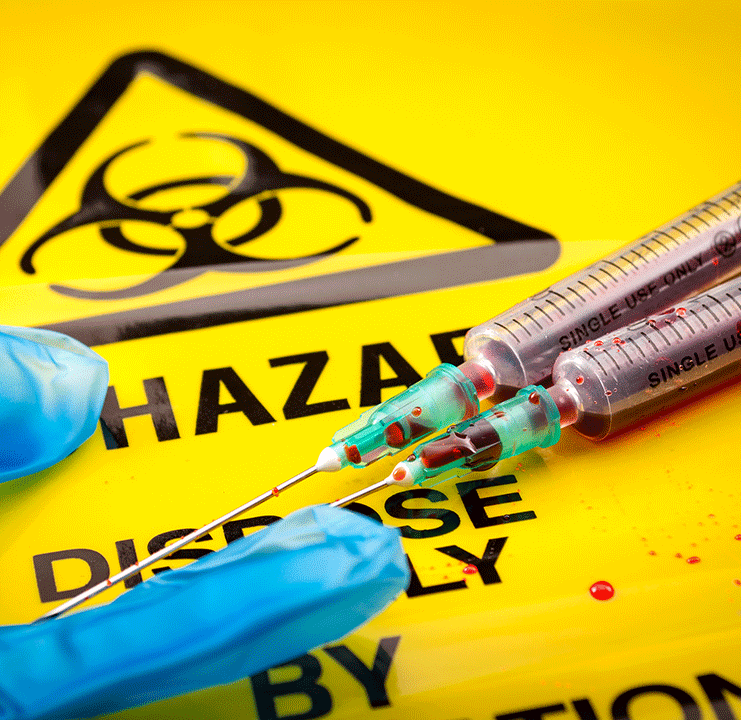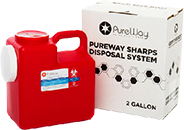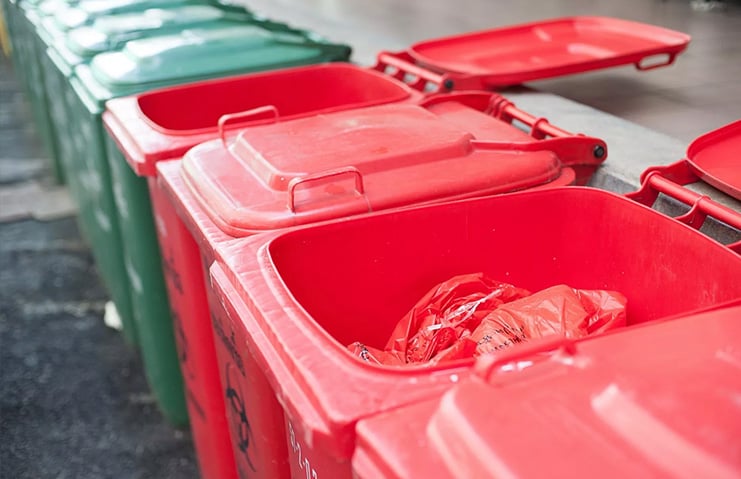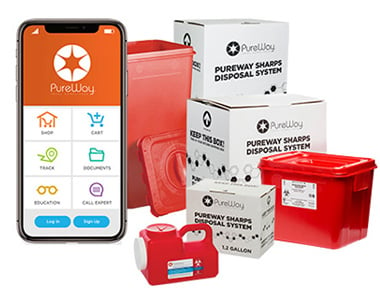

Over 200,000 locations are serviced nationwide; we provide simple, scalable, and cost-effective biohazardous waste disposal services for facilities of any size. Regardless of size, if you are a single provider, standalone clinic, or enterprise company with thousands of locations, PureWay® is your ideal service provider for medical waste disposal. Our team of bio medical waste specialists will help you determine the right options for your specific waste needs.
Bio Medical Waste companies often are limited by service area but PureWay's nationwide reach and multiple waste stream options makes us the ideal partner for your bio medical waste, sharps or personal waste at home.

PureWay’s medical waste disposal service safely collects hazardous bio medical waste which is defined as any item that comes into contact with blood or bodily fluids. This includes sharps placed in sharps containers, biohazardous waste, and any bloody materials from medical care as needed.
Reliable
On-time service nationwide to avoid unnecessary bulk waste accumulations.
Saves 40% on average
Lower rates and low-volume options provide excellent savings for your practice(s).
Flexibility
Adjust service frequencies, sizes, and service levels as your business grows with no penalties
Compliance
Our online compliance portal manages your compliance documentation and stores copies for you in the event of an audit.
Sharps Mail Back Systems vs. Route Truck Service
With a changing healthcare environment, we understand flexibility is very important to our customers. Whether a facility needs regular waste removal or occasional on-demand, PureWay can provide multiple convenient options to dispose of your medical waste and sharps containers. The two most common options for disposal of medical waste is sharps mail-back systems and medical waste truck service.

Route truck service is dedicated service for facilities that generate more than 50lbs of medical waste per month or for large accumulations of regulated medical waste. This is the most common method for disposal and involves the supplying of boxes or collection bin containers in advanced and then a scheduled pickup on a weekly, biweekly, monthly or bimonthly basis.
OSHA defines Regulated Waste in the Occupational Safety and Health Standards 1910.1030 as liquid or semi-liquid blood or other potentially infectious materials (OPIM); contaminated items that would release blood or OPIM in a liquid or semi-liquid state if compressed; items that are caked with dried blood or other potentially infectious materials and are capable of releasing these materials during handling; contaminated sharps; and pathological and microbiological wastes containing blood or OPIM.

Check your state regulations and definitions for medical waste disposal
https://www.pureway.com/resources/map-temp
There are numerous methods for treating medical waste, but the most used methods include autoclaving, incineration, chemical and microwave. These processes convert the once contaminated waste to decontaminated solid waste. Most medical waste companies will simply dispose of this decontaminated medical waste in a landfill, but PureWay offers a new method for disposal that gives true medical waste and sharps container recycling options.
Evaluating whether on-site treatment of medical waste is viable requires careful consideration of both cost-effectiveness and operational feasibility. Here’s how to approach this process:
Analyze Treatment Systems: Begin by examining a range of available medical waste treatment solutions. Consider the technology behind each system, such as autoclaving, incineration, or microwave treatment, looking at third-party providers with proven track records.
Evaluate Costs: Compare the initial setup costs, operational expenses, and long-term maintenance fees associated with each treatment system. Don’t forget to account for potential savings from reduced transportation and disposal fees.
Assess Facility Needs: Determine your facility's specific requirements. Consider the volume and type of waste being generated, as these factors will influence which treatment system is most compatible and efficient.
Regulatory Compliance: Ensure that the chosen system complies with local, state, and federal regulations for medical waste treatment. Stay informed about legal responsibilities and how each option meets these standards.
Expert Consultation: Work with industry experts who can provide insights based on their experience with various treatment methods. They can help tailor a solution that fits seamlessly with your operational needs.
Pilot Testing: Conduct a pilot test of the proposed system. This hands-on trial will reveal practical insights into operational feasibility and identify any unforeseen challenges.
Review Financial Impact: Review the financial outcomes against initial projections after the pilot phase. This analysis will highlight whether the potential system is indeed a cost-effective solution.
Ultimately, assessing on-site medical waste treatment involves a thorough research and strategic planning to ensure cost efficiency and operational viability. By taking these steps, you can develop a customized approach that aligns with your facility's unique needs.
Our waste specialist can help you determine what you need for your facility. Our specialist are experts on EPA, OSHA DOT, RCRA and DEA regulations that dictate how you manage and document your waste disposal.
16225 Park Ten Place, Suite 830, Houston, TX 77084. | 877 765-3030
© Copyright 2020 PureWay | Terms of Use